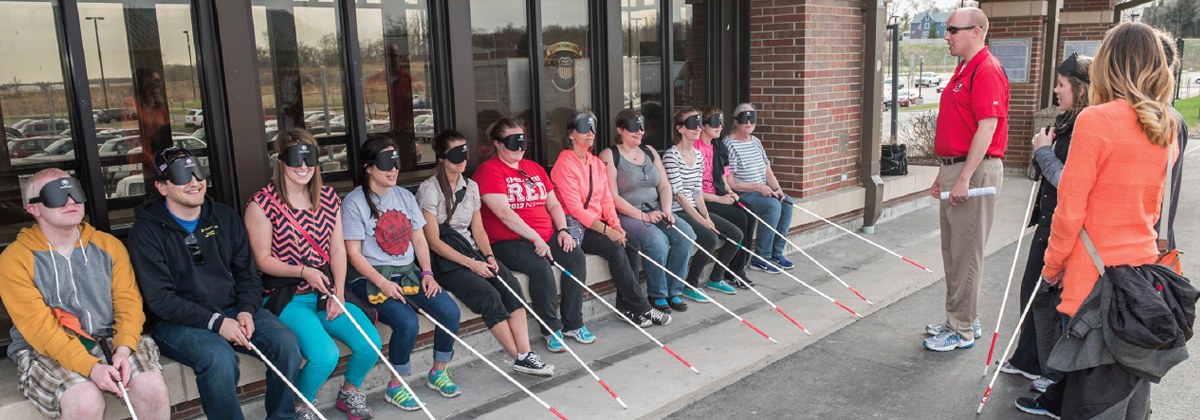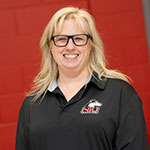- Special and Early Education
- Undergraduate Programs
- Special Education: Visual Impairments (B.S.Ed.)
Special Education: Visual Impairments (B.S.Ed.)

Our experiential and research-informed program in Special Education: Visual Impairments prepares you to work with students who are blind or visually impaired, providing strategies and tools to learn about the world, perform everyday activities and participate in the general curriculum and other activities from preschool through age 21 in school.
Many who finish our undergraduate program in visual impairments continue on to complete our M.S. Ed. in Special Education, Visual Impairments. Doing so would enable you to also work as an orientation and mobility specialist with children and adults who have visual disabilities; as an assistive technology instructional specialist for children and adults with visual disabilities; or as a vision rehabilitation therapist with adults who have visual disabilities. Our program is approved by the Association for Education and Rehabilitation of the Blind and Visually Impaired, Council for Exceptional Children and Illinois State Board of Education.
When you are admitted to NIU to pursue the B.S.Ed. degree in Special Education you'll enter directly into the major program.
- Admission to teacher education and retention in this major require a university GPA of 2.5.
- Grades of C or better are required in specific major courses.
- You must meet all ISBE testing requirements for teacher licensure.
The NIU College of Education embeds diverse, real-world learning opportunities in our programs, offering you valuable experiences you won’t get anywhere else.
- If you choose to live in Stevenson Towers’ TEACH House, home to students pursuing any area of teacher licensure, you'll interact with teacher licensure faculty as well as peers with similar professional aspirations.
- Our faculty collaborates with students to facilitate research, service and teaching initiatives within Illinois and throughout the country.
- Candidates progress through the program as a cohort group, developing friendships and professional partnerships that last well beyond graduation.
Our program for Teachers of the Visually Impaired is one of a very few accredited programs in the United States. Our extensive emphasis on assistive technology proactively addresses the critical shortage of vision personnel with that vital expertise. You’ll receive intensive training and support that is specific to low vision and blindness – and it comes from knowledgeable sources. Professor Stacy Kelly is an Assistive Technology Certification Subject Matter Expert, appointed by the leading credentialing organization for vision rehabilitation and educational professionals.
- SEVI 400 - Education of Students with Visual Impairments (3 credits)
- ETT 402 - Teaching and Learning with Technology (3 credits)
- SEVI 420 - Literary Braille (3 credits)
- SEVI 421 - Advanced Braille (3 credits)
- SEVI 430 - Basic Orientation and Mobility for Teachers of Persons with Visual Impairments (3 credits)
- SEVI 440 - Communication Systems Used By Persons with Visual Impairments (3 credits)
- SEVI 441 - Instructional Systems for Use of Low Vision in Educational Settings (3 credits)
- SESE 444 Instructional Methods and Strategies for Middle and Secondary Students with Mild Disabilities (3 credits)
- SESE 447 Consultation, Collaboration and Communication Skills for Special Educators (3 credits)
- SESE 449 Early Field Experience in Special Education: Middle/Secondary (2 credits)
- SEVI 450 Assistive Technology for Individuals with Visual Impairments (3 credits)
Job prospects for now and the foreseeable future are excellent, particularly if you’re willing to relocate. Research has shown that at the current rate of graduation in our field, the United States will not keep up with the needs of visually impaired individuals. Many of our graduates are recruited by the personnel at the sites where they student-teach or intern.
We boast a 300 percent job placement rate: Our graduates often have three job offers on the table before they collect their diplomas.

"My professors are so supportive and personal. They want us to succeed. This is especially true of Stacy Kelly, one of the most encouraging and enthusiastic teachers I have had. She cares about students, and she knows how to make extremely difficult subjects easier to understand." by Kelly Wakefield, Visual Impairments Major
- Undergraduate Programs
- Early Childhood Education (B.S.)
- Special Education, Learning Behavior Specialist I (B.S.Ed.)
- Special Education, Special Populations (B.S.Ed.)
- Special Education, Vision Rehabilitation Therapy (B.S.Ed.)
- Special Education, Visual Impairments (B.S.Ed.)
- Special Education Foundations (Minor)
- Inclusive Teaching Practices (Certificate)
- Young Children with Disabilities Studies (Certificate)
- Special Education (Endorsement)
Contact Us
Special and Early Education
Allie Shirar, Academic Advisor
815-753-9034
ashirar@niu.edu